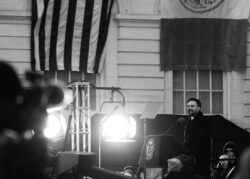Underneath the Christmas star that seems, in the dark, to float on the Healy building, a small group of students gathered for a candlelit vigil last night. They were members of STAND: A Student Anti-Genocide Coalition, marking the end of a day of fasting to raise money for refugees displaced by the genocide in Darfur. Far be it from me to inflict a journalistic cliché on you, but as the group worked together to light their candles in the freezing cold while other students shuffled numbly by through the slush, there seemed to be a bit of metaphor in the air. Not a million points of light, but enough.
Do you remember the first time you heard about the genocide in Darfur, a province in Western Sudan? I do. It was on a STAND poster back in late 2004, when STAND was still Students Taking Action Now Darfur, and before it grew, changed its name and merged with another organization. I was astonished to learn that hundreds of thousands of people were being murdered with barely a ripple of notice. That was the very beginning of what today has become a massive anti-genocide movement, sparked in large part by students here at Georgetown.
Most of us know something about STAND and the work it does here on campus, like the Week for Darfur and yesterday’s fast, which since 2005 has collected over $400,000 for threatened civilians in Darfur. But the constant failure of international leaders and institutions to actually do something about the continuing genocide has discouraged even the most active among us. How many times can we read about the latest reasons that peacekeeping troops aren’t being deployed to Sudan, whether it is the obstinacy of the genocidal regime in Khartoum or the lack of interest on the part of U.S. and other countries, and not be frustrated?
Erin Mazursky (SFS ’07) understands frustration. She is one of STAND’s original members and a former executive director of the organization. Today, she works for Save Darfur, another anti-genocide coalition.
“[The continuing genocide] doesn’t shake my belief in the fact that grass-roots is really important,” she said. “It speaks to the complexity of the issue and the fact that we need to continue to push harder and become a more united front. There is a risk of activist burn out; we’ve been doing it for four years.”
And there have been successes. Most importantly, Mazursky—who, full disclosure, is also a friend—points out that in the spring of 2006, not even 12 percent of Americans knew about Darfur. Today, as a result of activist campaigning, over 60 percent are aware of the issue. Activists have also forced the government to label it a genocide and even embarrassed China, the primary outside sponsor of the Khartoum regime, into taking some action, though not enough, to force peacekeepers into Sudan.
Currently, Sudan is wracked by conflict. Darfur itself has become so dangerous that few outsiders can go there safely to document what is happening, but we do know that since the genocide began in 2003, more than 400,000 people have been killed, and 2.5 million have been displaced as regfugees. The genocide began as a counter-insurgency campaign that has now morphed as warring groups, both government-sponsored and rebellious, fight amongst themselves. The conflict is also threatening the hard-won peace achieved in the wake of a north-south civil war in the country.
The answer, some Darfur activists say, lies in continuing to pressure China, which buys the most Sudanese oil. China can force the Sudanese government to admit a long-awaited U.N. peacekeeping mission to replace the largely ineffective African Union troops there now. So far, no NATO countries, including the U.S., have offered the necessary logistical support for the U.N. troops, but that could change if the Khartoum government lets them into the country. Today, STAND activists plan to participate in a torch relay designed to remind observers that the country hosting the Olympics next year is also a de facto genocide supporter. If nothing more is done, the 2008 Olympics will, and should, be remembered as the genocide Olympics.
Boycotting the 2008 Beijing Olympics would not be an unreasonable response to the intransigence of the Chinese government. It would be the first time since 1980, when the U.S. boycotted the Moscow Olympics in response to the 1979 Soviet invasion of Afghanistan.
What more can be done at Georgetown? For one, the University can ensure that it is not investing in companies, including Chinese oil companies, that do business with Sudan. While the University has told activists it has no direct investments, there is concern that opaque mutual fund-type investments might still send Georgetown dollars to the genocidaires, according to Hailey Flynn (SFS ‘08), who hopes the University will issue a statement saying that they will not invest in Sudan directly or indirectly. Flynn was part of a coalition that successfully convinced the D.C. government to remove $150 million of investment from Sudan this fall.
Despite these successes, and the frustration of the continuing genocide, activists take hope in creating what expert John Prendergast calls “the first popular movement against a real-time genocide since the term ‘genocide’ was coined over half a century ago.” Maria Paz Cambronero (SFS ’08), who has worked with STAND since her freshman year, takes pride in her hope that, even if aid may come to Darfur too late, there will be a system in place in time for the next genocide. Our president, who pledged “not on our watch” when he was briefed about the ethnic cleansing in Rwanda, hasn’t done as much. But those who have done the hard work to build an anti-genocide coalition should be proud.




